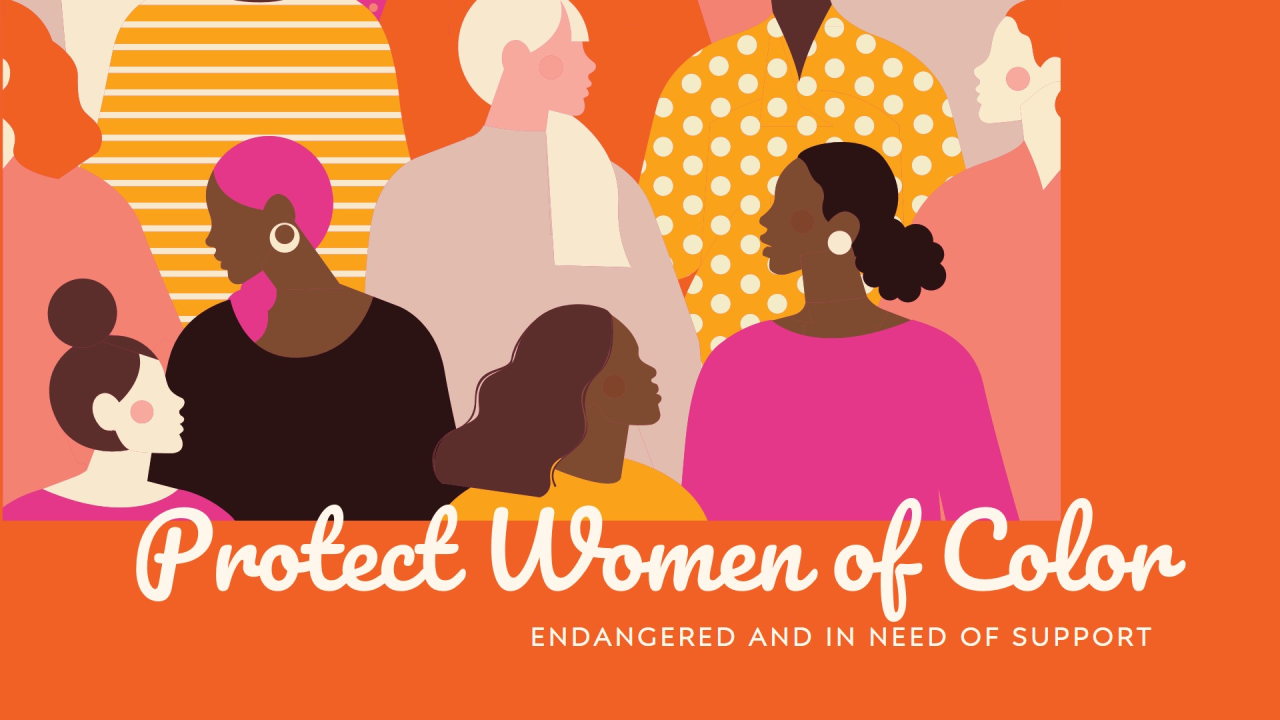Why are women of Color endangered in the workplace?
Have you taken a moment to think about the realities of toxic stress and systemic oppressive practices in workplace cultures that continue to put the well-being of women of Color at risk of harm, including the risk of suicide?
Recently, I took some time to analyze, assess, and reflect on my caseload of clients and their presenting problems. I found that about 98% of my clients (women of Color) are reporting significant workplace stressors that are negatively impacting their mental, emotional, and physical well-being, with evidence demonstrating that these stressors are keeping them and their nervous system in a persistent toxic stress mode. These harmful occupational toxic stressors are spilling over into other areas of their lives and impacting their interpersonal interactions, financial, social, and home, manifesting in various ways that also impact their children and loved ones.
I then asked myself the following questions… “I wonder if employers and leaders are taking into consideration the various cyclical ripple effects of occupational toxic stressors. With DEI efforts being such a hot topic over the last several years, is this even a thought on how occupational toxic stressors they are fostering impact their BIPOC employees? Are they taking a deep dive into better understanding how expensive it is to replace just 1 employee, or even thinking about the expensive legal ramifications they can face? Do employers actually care to improve BIPOC employee satisfaction and change their toxic workplace cultures (aka systemic oppressive practices) that historically protect white supremacy in the workplace? Are employers truly understanding why workplace psychological safety is imperative?”
(Yes; unfortunately, white supremacy and historically oppressive practices are still a “thing” in 2024).
I also found common themes being reported of various forms of toxic and illegal workplace practices by managers and executive leaders that clearly indicate workplace psychological abuse and gaslighting, with no knowledge of how to self-protect. For example, intimidation, microaggression, retaliation, threats, discrimination, and biases. Sadly, these reports have demonstrated patterns of both covert and overt toxic behaviors and practices, exhibiting evidence that my BIPOC clients are challenged with effectively implementing the coping strategies I teach them during their therapeutic sessions. It also disrupts the therapeutic process and journey to effectively focus on treating lifetime traumatic experiences that occurred before they began working for their employers.
The outcomes of individuals experiencing workplace psychological abuse can be debilitating, even deadly. Experiencing daily stressors caused by exposure to persistent toxic workplace environments keeps them in fight or flight, freeze, or fawning states of trauma responses and physiological reactivities, triggering and retriggering their complex traumas. Essentially these experiences develop feelings of hopelessness, helplessness, and feeling defeated and stuck; for some, even leading to experiencing suicidal ideations, suicide attempts, and even dying by suicide.
I often hear, “Maria, what can I really do about it? They don’t care about me, and I need this job to live and support my family. And HR doesn’t care either because nothing changes, but it makes things worse, so I just don’t say anything anymore.” As a woman of Color and human, my heart breaks when I hear similar statements, and as a Licensed Professional Counselor and trauma specialist, I often feel helplessness and compassion fatigue. However, this fuels and increases my continued efforts as a Workplace Wellness Coach and Consultant to continue providing training and education to organizations and educational spheres by using my expertise to be a voice and advocate for other BIPOC employees who are unable to use theirs!
Sadly, the risk of suicide is very real, and the suicide rates are at an all-time high! For BIPOC employees across all workplaces and industries, the intersection of workplace toxic stress, home life and economic challenges, sleep deprivation, systemic oppression and discrimination, and mental and physical health issues often intensify the negative impacts of generational trauma, adding to the cycles of stress and marginalization.
Continuing these conversations and highlighting the impacts of gaslighting in the workplace is important. According to the Merriam-Webster dictionary, the term gaslighting refers to the “psychological manipulation of a person usually over an extended period of time that causes the victim to question the validity of their own thoughts, perception of reality, or memories and typically leads to confusion, loss of confidence and self-esteem, uncertainty of one’s emotional or mental stability, and a dependency on the perpetrator”, https://www.merriam-webster.com/dictionary/gaslighting.
Highlighting the realities of the harm and trauma that workplace psychologically abusive tactics, behaviors, and practices of gaslighting cause BIPOC employees is absolutely imperative! Why wouldn’t someone feel worn down, defeated, hopeless, confused, afraid to speak up and self-advocate, feeling trapped with no way out because they are financially dependent on their abusive employer? How could their emotional and mental health not be impacted?
Workplaces cannot foster psychologically safe environments if there is no legal accountability and consequences for psychologically abusive practices. I recently read an article about a Black woman who died by suicide on January 8, 2024. Ms. Candia Bailey, was an administrator at Lincoln University in Missouri and left a very detailed final letter discussing her experiences with workplace psychological abuse. According to a CNN article, she described in her letter that, “…she was “harassed and bullied” by superiors and was ignored when she expressed concern for her mental health” An administrator at HBCU Lincoln University died by suicide. It’s raising painful questions about Black mental health | CNN.
Not only did this terrible and tragic loss resonate with me personally, causing me to feel deep sadness for Ms. Candia Bailey, and everyone impacted by her loss, but it also made me think about all of my clients. As a workplace trauma survivor and trauma specialist, I was reminded of my own experiences with workplace psychological abuse, as well as my experiences with biases and discrimination in educational spheres. As a trauma specialist and mental health provider, the stories of similar experiences that my clients share appear to be endless and ongoing.
Having financial security through employment allows individuals to access income and provide for themselves and those they support, some of the most essential basic human needs. Maslow’s Hierarchy of Needs pyramid demonstrates that psychological needs are at the primary foundation, followed by safety and security. It is so interesting that the first two areas on the hierarchy of needs pyramid are the exact same needs toxic workplaces are ignoring!
When these two basic human needs are not met, nothing else can help an individual feel that they are living a fulfilled life. Workplace psychological safety fosters personal and professional contentment. Employment not only secures financial stability and security, enabling individuals to meet fundamental needs for themselves and their dependents, but it also intersects deeply with Maslow’s hierarchy of needs as it highlights the importance of psychological well-being and safety. Without these core needs being met, individuals are challenged with their daily functioning in their occupational, social, and personal lives. It is evident that creating environments that foster psychological safety at work is crucial for holistic well-being.
How can a woman of Color feel safe in the workplace if her basic needs are threatened on a daily basis? How can she feel inspired and empowered, and feel satisfaction in the workplace? How can she remain engaged and productive in her role at work? How can she feel a sense of security and belonging in her workplace? How can she maintain good and adequate physical health if her mental health is at risk each day she enters her workplace environment? How can she feel good about herself as the caregiver of the loved ones she supports? How can she feel secure in seeking mental health treatment if her employer-funded health insurance premiums, yearly deductibles, and copays are not affordable?
According to two blog articles from the U.S. Department of Labor’s website posted in 2021, although Latinas are one of the largest groups of women in the workforce, “Latinas have consistently earned less than 60 cents for every dollar earned by non-Hispanic white men; and today’s gap is only about five cents smaller than it was in 1990” https://blog.dol.gov/2021/10/20/5-facts-about-latinas-in-the-labor-force?_ga=2.173517675.912858791.1713494144-988797307.1713494144, and “Black women earn 63 cents for every dollar earned by white, non-Hispanic men” https://blog.dol.gov/2021/08/03/5-facts-about-black-women-in-the-labor-force. With these facts of continued pay inequities and reflecting back on Maslow’s hierarchy of needs, how can women of Color not feel the pressures and demands of life, particularly when they are head of household?
Organizations must take action to make workplace psychological safety a priority, ensuring that they have strong policies and practices, as well as creating adequate budgets to invest in educating and training their employees, from the executive leaders to the teams they lead. It is a basic human right!
Women of Color and their loved ones will continue to be at risk of traumatic exposures if leaders do not prioritize changing the workplace practices and cultures that foster psychological abuse. The Occupational Safety and Health Administration (OSHA) has initiated efforts to prioritize organizations making safety a core value and is intended to “…identify barriers and challenges for improving workplace safety and health culture (e.g., financial, social, behavioral) and for reducing workplace injuries, illnesses, and fatalities” https://www.osha.gov/safety-management/safety-core-value. This is great; however, it is a reality that in 2024, employees are still not yet legally protected against workplace psychological abuse.
I don’t believe change can happen overnight. It’s a process that requires strong accountability efforts and implementation of zero-tolerance policies and practices that will not excuse, forgive, condone, disregard, or sweep under the rug workplace psychologically abusive behaviors and practices. I also don’t believe that a cookie-cutter framework can magically fix these real-life issues women of Color are confronted with. The issues within the oppressive systems and cultures in and out of workplaces are very complex yet very much intersect. However, I do believe that change is possible if and when each complex area is properly identified and addressed, having strong and clear legislation to protect against such psychologically abusive practices. This is the only way to ensure that all areas of human basic needs are met for women of Color and, hopefully, reduce the risk of harm they face on a daily basis.
Women of Color are an incredible asset to the workplace, with many talents and gifts that can add to the success of an organization. They deserve a safe place to grow professionally and feel encouraged, empowered, and protected, earning their deserved equal pay to their white counterparts. When they feel satisfied and fulfilled professionally, putting their talents and gifts to work, their home and social lives are also positively impacted. It becomes a WIN-WIN situation for everyone!
**If you or someone you know are struggling with thoughts of suicide, please call the 988 Suicide & Crisis Lifeline by dialing 988 to connect with a trained counselor who can offer you support. You can also visit the 988 Lifeline website.


